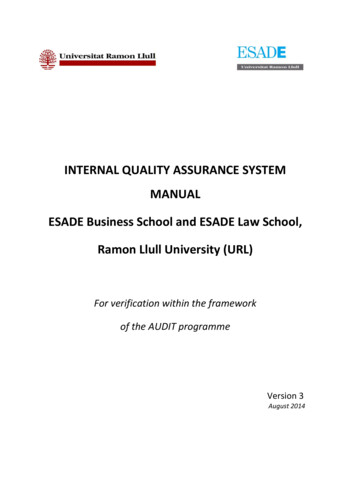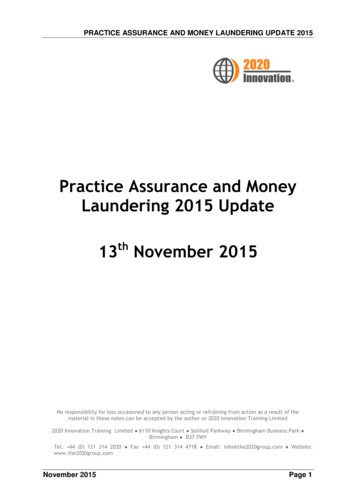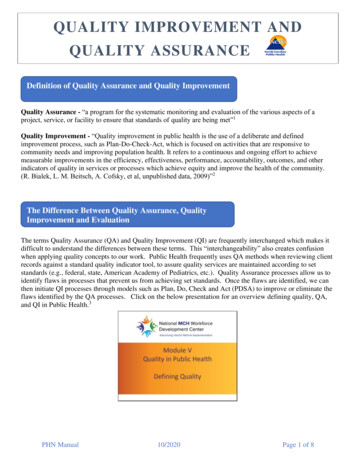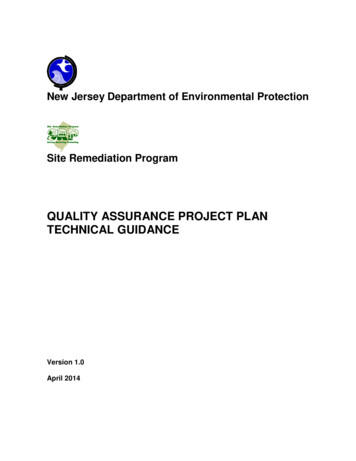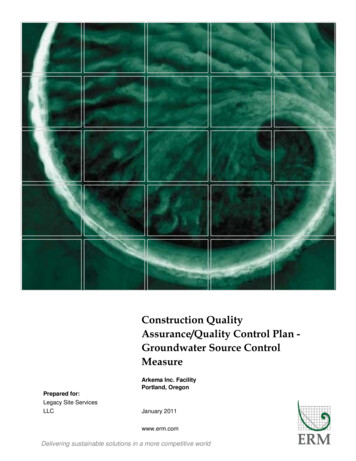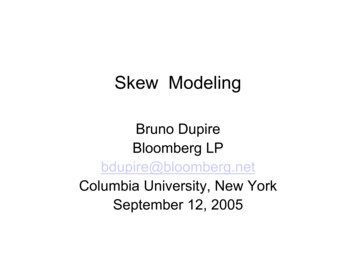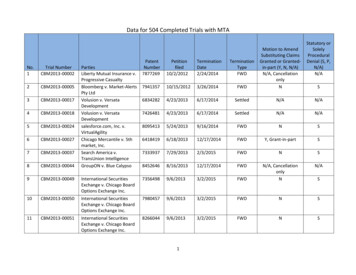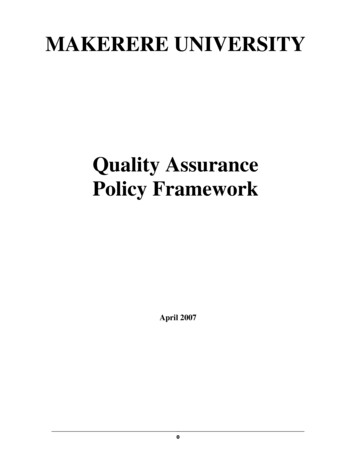
Transcription
MAKERERE UNIVERSITYQuality AssurancePolicy FrameworkApril 20070
Table of ContentsTABLE OF CONTENTS . 1SUMMARY OF THE QUALITY ASSURANCE POLICY. 2PROBLEM STATEMENT . 2QUALITY ASSURANCE POLICY. 5QUALITY ASSURANCE MISSION . 5QUALITY MANAGEMENT STRUCTURE. 17FIGURE 1: PROPOSED QUALITY ASSURANCE COMMITTEE . 25STRUCTURE . 25FIGURE 2: PROPOSED STRUCTURE FOR THE QUALITY ASSURANCE UNIT. 1CODES OF PRACTICES. 272.10 CODES OF PRACTISE FOR QUALITY IN RESEARCH . 393.0COLLABORATIVE PROVISION ON QUALITY. 433. 4.ROLES AND RESPONSIBILITIES . 443.5 INTERNAL COLLABORATION BETWEEN UNITS . 454.0QUALITY OF EXPERIENTIAL AND FLEXIBLE LEARNING . 474.4QUALITY ASSURANCE SYSTEM FOR DISTANCE LEARNING . 505.0EXTERNAL EXAMINING . 525.3 ROLES AND RESPONSIBILITIES FOR EXTERNAL EXAMINERS . 52ACADEMIC APPEALS AND STUDENT COMPLAINTS ON ACADEMIC MATTERS . 587.0STUDENT ADMISSION, ASSESSMENT AND QUALITY STANDARDS . 638.0PROGRAMME APPROVAL, MONITORING, & REVIEW . 729.0 STAFF RECRUITMENT, DEVELOPMENT AND APPRAISALS. 809.2.STAFF VALUES. 809.2.1COMMITMENT TO VALUES . 819.3QUALITY OF ACADEMIC STAFF. 8110.0 CAREER GUIDANCE BASED ON TRACER STUDIES. 86GUIDELINES ON EQUALITY OF OPPORTUNITIES . 89APPENDIX C: OTHER SOURCES OF INFORMATION . 92ANNEX F . 931
SUMMARY OF THE QUALITY ASSURANCE POLICY1.BackgroundMakerere University’s Strategic Development Plan of 2000/1-2006/7 defined thedirection Makerere University would follow during the period to serve and meet thechanging needs of society by providing quality higher education in Uganda and beyond.Key to achieving this strategy is the development of an effective and efficient QualityAssurance (QA) system underpinned by quality teaching, research development,curriculum development, student progression and welfare, focused on the needs ofMakerere University, the African region and beyond.A Quality Assurance system is now being proposed by the Senate Quality AssuranceCommittee based on findings and a report by the Quality Assurance Task force whichwas set up by the Vice-Chancellor in November, 2005.Problem StatementCurrently Quality Assurance at Makerere University takes a variety of methods both internaland external. Internal Quality Assurance takes the form of moderation of examinations papersby peers, vetting by Senate committees the programmes proposed. External Quality Assurancemeasures comprise a system of engaging external examiners to vet examination andpublications of staff that apply for promotion. These measures have been largely seen as noteffective in coping with the rapid expansion of the University as revealed by the findings ofbaseline studies carried out by members of the taskforce. Student numbers have increased overthe last 10 years, from 5,000 in 1994 to over 30,000 in 2006. These large student numbersposes a challenge to the management of learning and teaching within the different universityunits.The baseline studies which were carried out in 2005 revealed the limitations of the currentquality control methods in Makerere University, where in many cases, the emphasis had beenmainly on controlling inputs, with comparatively little attention given to the processes andoutputs. At institutional level, there has been little capacity to monitor educational performancein a systematic manner as well as failure to implement the quality related decisions in theuniversity. It was observed during one of the workshop that implementation of decisions andoutcomes of reports related to quality were weak partly because there was no responsible Unitwithin the University to make a follow up on issues agreed upon in such reports.To address these critical issues, Makerere University needs to develop a Quality AssuranceFramework that clearly spells out Principles, Guidelines, and Procedures for implementinginstitutional quality assurance process.2. Quality Assurance Structure and Policy FrameworkThe framework provides goals and objectives for setting up the Quality AssurancePolicy. It also lays down principles and guidelines which will guide in theimplementation. The framework proposes that a Quality Assurance ManagementStructure be put in place to coordinate the implementation of the policy.2
The significant features of the QA Structure include the setting up of a Joint UniversityCouncil and Senate committee to be known as University Quality Assurance Committee(UQAC), Faculty/Institute/School Quality Assurance Committees and creation of QualityAssurance Directorate. The Non-teaching Departments will coordinate theimplementation of the QA Policy through the Quality Assurance Administrative Team.In general the implementation of the QA Policy will be spearheaded the University TopManagement under the leadership of the Vice-Chancellor. The Policy shall apply to allunits of the University through internal quality assurance mechanisms on a continuousbasis and external quality Assurance strategies which will be periodic. The InternalQuality Assurance mechanisms shall focus on the quality of: programmes and courses;staff; teaching and learning experiences; staff/student performance assessment; supportservices; resources and facilities; and research.3. Codes of PracticesSection three, of the Quality Assurance Framework provides codes of practices that shallserve as benchmarks and guidelines for implementation of the Quality Assurance Policy.The codes of practices are categorized as follows:i. Sources of Information and Accessibilityii. Maintenance of High Quality Research and Postgraduate Programmesiii. Collaborative Provision on Quality and Standardsiv. Quality of Experiential and Flexible Learningv. Academic Appeals and Student Complaints on Academic Mattersvi. Student Admission, Assessment & Quality Standardsvii. Programme Approval, Monitoring & Reviewviii. Staff Recruitment, Development & Appraisalix. Career Guidance Based on Tracer Studies.x. Equality of Opportunities.The Quality Assurance activity is a continuous process. It is therefore hoped that lessonslearnt during the implementation of this policy will be adapted into the laid downmechanisms to ensure the mission of University is achieved. Each of these key areas hasa dedicated section providing precepts and general guidelines on quality assurancemechanisms, as organized in this report which may be revised whenever its principles aresignificantly affected by changes in policy or procedures as agreed by the joint UniversityCouncil- Senate Committee.PreambleWhereas Makerere University is Uganda’s premier and leading public institutionof higher learning and;Whereas the University is ranked as one of the largest and leading Universities inEast and Central Africa,Cognizant of the University’ Vision to become a center of academic excellence,providing world class teaching, research and service relevant to sustainabledevelopment needs of society,3
Cautious of the Universities and Other Tertiary Institutions Act, 2001 andAmendment 2006 which requires institutions of higher learning to ensure thattheir standards conform to the standards set by the National Council of HigherEducation,Aware of public concerns about the deteriorating standards at the University,Aware of the many emerging institutions of higher learning in the country thatcould pose serious competition to the University, for not only students but alsoacademic and other professional staff,Informed by the University’s Strategic Development Plan 2000/1-2006/7,Now therefore, the Makerere University Senate through this policy instrumenttakes positive and proactive steps to ensure quality teaching, learning, researchand outreach services relevant to the needs of the institution,This policy specifies the University’s approach to quality assurance andcontinuous improvement as well as its principles, features, structures andstandards. The University wishes to assure quality teaching, learning, research,research training and service delivery through a regular review and improvementprocess.Makerere University is a dynamic community of students, scholars and staffcommitted to performing at the highest standards. The University’s aim is toprovide a stimulating and innovative environment for teaching, learning, researchand research training. Its approach to quality assurance and continuousimprovement is to learn from best practice, locally and internationally, andbenchmark against leading research universities.4
QUALITY ASSURANCE POLICYPurposeInternational concerns about how to maintain quality control in an environment thatincreasingly puts acute pressure on the traditional modes of teaching, research, learningand management have forced most developed countries adopt a formal, transparent andcredible systems of quality assurance with external verification of outcomes andprocesses.The aim of the Makerere University’s quality assurance policy is to enhance theeffectiveness of its core activities of learning, teaching, research performance, researchtraining and management. The policy addresses all areas of the University’s activitiesfocusing on their contribution to and in alignment with the University’s Strategic Goals.Quality Assurance MissionMakerere University’s Quality Assurance Mission therefore is:To promote confidence in the academic provision (teaching, research and outreach services)that the quality and the standards of awards of Makerere University are safeguarded,enhanced and effectively managed.This mission statement provides Makerere University with ample opportunities against which tobuild further and develop its quality of teaching, learning, and research base.Features1. A commitment to widespread involvement of staff, students and other stakeholders inthe QA process.i. Critical self-evaluation and rigorous peerreview of academic andadministrative areas;ii.Methodical collection of evidence about service satisfaction and studentexperience, including external comparisons;iii.External assessment of professional courses through accreditation andinternational review;iv.Multiple avenues for student and staff input to QA and improvement: College,Faculty, School, Services, Academic Board and committees, studentassociations, and;v.Systematic use of client experiences to improve staff development andtraining.2. A focus on efficient management, planning and resource processes to achieveexcellence and to ensure continuous improvement.5
i.ii.iii.iv.v.vi.vii.viii.ix.University-wide strategic goals linked to plans, priorities and review system;Strong Academic Board and committee structure to develop, implement andoversee academic policies;A regular cycle of reviews of all faculties and administrative services units;Alignment between academic and administrative review processes;A process for monitoring implementation of the recommendations of reviewsthrough Makerere University administration (Senate and Council).Performance-based funding of teaching and research;Allocation of funding to address areas of improvement;Annually-updated faculty teaching and learning plans, linked tofunding; andA performance management and development system for all staff,including managers.3. A commitment to judging outcomes and processes against the highest externalstandards;i. Formal links with many of the world’s leading universities: national andinternational benchmarking of academic standards and outcomes and;ii. National and international benchmarking of quality assurance processes withcomparable research-led universities.1.0DEFINITIONS1.1AssessmentIn the context of quality assurance, assessment is the process of identifying andensuring that appropriate internal procedures are in place and operational and thatoutcomes of academic programmes and activities are in accord with establishedstandards.1.2AuditAudit is a process of identifying and ensuring that appropriate internal qualityassurance processes are in place and operational.1.3Programme ReviewProgramme review is a process of holistic appraisal of a course/programme andresources, with a view to its further evolution and improvement.1.4QualityIn this document and in the context of academic programmes at MakerereUniversity, the term quality refers to “fitness for purpose” (i.e. the institution andits components of activities have “quality” if they conform to the purpose forwhich they were designed).1.5Quality AssuranceThe process whereby measures are established which ensure that outcomes ofacademic programmes and activities are of a prescribed standard.6
1.6Quality controlThis is the process whereby outcomes are assessed to determine whether they areof the prescribed standard.1.7Quality ManagementQuality management refers to all the processes that are in place to facilitateachievement of quality in an institution.1.9StakeholdersThe term stakeholders include agencies (government and private) that controltertiary institutions, individuals, groups that participate in or have responsibilitiestowards tertiary education in Uganda.2.0AIMS AND OBJECTIVES OF THE POLICYGoals and ObjectivesEffective institutional quality assurance processes assess quality against their mission andrelated objectives. The University will strive to be an example of an efficient andeffective QA system development in Uganda. The University in this QA framework hasadopted Quality as “fitness for purpose": a concept that stresses the need to meet orconform to generally accepted standards such as those defined by an accreditation orquality assurance body, the focus being on the efficiency of the processes at work in theinstitution or programme in fulfilling the stated, given objectives and missionGoals and Objectives are the key drivers of a “fitness for Purpose” model of qualityassurance. They need to be set clearly and explicitly, and in ways that can beoperationalized effectively. They set the framework for planning, monitoring andmeasuring outcomes. They also facilitate communication with stakeholders such asemployer, industry, government, students and parents2.12.2The Academic Quality Management Policy aim is to support the university’sefforts to achieve its Mission and Vision through development andimplementation of academic programmes that meet national, regional andinternational standards.The objectives of the Academic Quality Management Policy include thefollowing:(i)(ii)(iii)(iv)To provide guidance in development and implementation of internaland external quality assurance procedures and practices.To ensure that the quality of academic programmes at the MakerereUniversity meet standards expected by stakeholders.To ensure that graduates have attained skills and knowledge throughMakerere University academic programmes that are valued by stakeholders.To enable Makerere University to assure itself, its stakeholders and theNational Council for Higher Education (NCHE) that the University’spolices, systems and processes for the development, maintenance andenhancement of quality in all its educational provisions are functioningeffectively;7
(v)To provide guidance in identifying internal and external standards andcriteria consistent with internationally recognized standards.(vi)To assist in maintaining and developing quality of academicprogrammes through enhanced support processes.(vii) To facilitate development of a culture of continuous qualityimprovement to achieve academic excellence.(viii) To enable identify areas of strength and excellence as well as areas in needof focused attention for continuous improvement in the short, medium andlong-term;(ix)Through the University organs to strengthen the independent role played bythe Quality Unit in quality management and enhancement.These aims can further be divided into specific implementation objectives as qualityassurance management activities.1. Harmonise various quality assurance aspects/activities within Makerere University;2. To ensure an effective performance of staff and students;3. To strengthen ties with Regional, National and International Quality Assuranceagencies and universities;4. To improve the University environs in order to attract and retain staff and students;5. To continuously improve the QA system, through reviews, streamlining andmodernizing of QA function, policies, procedures and their supporting protocols;6. To provide leadership in the transformation of the Makerere University core QualityAssurance business processes through the implementation of Quality assuranceinitiative.3.0PRINCIPLES UNDERPINNING THE POLICYSome of the principles underpinning Makerere University approach and modusoperandi are outlined. A summary is provided below. These will need to shape, ifnot determine Makerere University methodologies of accountability andimprovement. Several key principles are incorporated into this Policy. Theprinciples relate to the quality framework and processes outlined in thisdocument.3.0.1Principle 1:“Holistic” approach.3.0.2Principle 2:“Based on self-assessment” – “Trust but verify”.3.0.3Principle 3:“Improvement focus”.3.0.4Principle 4:“Planning framework”.3.0.5Principle 5:Data and resources3.0.6Principle 6: Quality teaching, learning, research and administrativeservices and continuous improvement as a core value3.0.7Principle 7:Benchmarking and evidence-based approach8
3.0.84.04.14.24.3Principle 8:Collegiality and Team Spirit.QUALITY ASSURANCE MECHANISMS/FRAMEWORKThe notion of quality underpinning the framework adopted by the MUQA is of“fitness for purpose” (i.e., the institution and its components and activities have“quality” if they conform to the purpose for which they were designed). Theframework reflects the MUQA’s dual purpose; as a mechanism for accountability.The policy shall apply to all Faculties/Schools/Institutes, and both academic andsupport staff at Makerere University through:4.1.1 Internal Quality Assurance Mechanisms – Continuous4.1.2 External Quality Assurance Mechanisms - PeriodicThe University, through Council, shall determine and approve qualitymanagement frameworks for all Faculties/Schools/Institutes.Regular internal audits will be conducted to ensure that the Quality AssurancePolicy is implemented.4.4Areas of Internal Quality Assurance4.4.1 Internal quality assurance mechanisms are departmentally generated andare continuous. The mechanisms shall be coherent with the qualityassurance framework set forth in this policy and approved by Council andshall include mechanisms to assess the following areas;4.4.1.1Quality of programmes and courses4.4.1.2Quality of academic staff4.4.1.3Quality of teaching and learning experience4.4.1.4Quality in student assessment: Internal moderation4.4.1.5Quality in support services4.4.1.6Quality of resources and facilities4.4.1.7Quality of research4.4.1.8Quality program review process4.5External Quality AssuranceTo ensure that high quality standards are maintained, the following externalmechanisms shall be utilized;4.5.1External Academic Review4.5.1.1 Quality of educational programmes shall be assured through ExternalAcademic Review by any of the following bodies:i. External Examinersii. External Professional bodiesiii. External accreditation agencies (for professional programmesthat have recognized, credible professional accreditationagencies)iv. Employersv. Former studentsvi. Other Universitiesvii.9
5.0RESPONSIBILITY FOR POLICY IMPLEMENTATIONThe Vice Chancellor shall oversee the implementation of the policy.6.06.1MISSION, VISION AND VALUES STATEMENTMakerere University Vision, Mission and Values Statement shall underpin theexecution of this policy. Makerere University’s current Mission Statement is, “toprovide quality teaching, carry out research and offer professional services tomeet the changing needs of society by utilizing world-wide and internallygenerated human resources, information and technology to enhance theUniversity’s leading position in Uganda and beyond.”Makerere University’s Vision is, “to be a centre of academic excellence,providing world-class teaching, research and service relevant to sustainabledevelopment needs of a society.”NB: The mission and vision statement is currently under review for 2007/2017strategic planIn pursuing Makerere University Mission, the University shall be mindful ofmaintaining and reinforcing its core values of:i. ---a global outlook and outreachii. ---breath of vision, creativity and openness to changeiii. ---collaboration and team work.iv. ---excellence and continuous improvementv. ---transparent and courteous internal and external communicationin the organizationvi. ---the highest intellectual and ethical standards and;vii. ---the values of humane and just society; andin realizing Makerere University as an internationally recognized and globallyfocused, research-intensive institution, with a vigorous learning and teachingenvironment; the University commits an equivocal commitment to high qualitypermeating all dimensions of academic activities and support services.NOTES:1.0Introduction1.1These notes shall provide further clarification of the Quality Assurance Policyprovided in this document.1.2It was recognized, however, that in order for Makerere University to achieve itsVision to be “a leading center of academic excellence in Africa, and the world”, asystem of quality management needed to be in place.1.3This document describes a policy and framework for Academic QualityAssurance at Makerere University that will facilitate achievement of theUniversity Vision and the Uganda Government Vision 2017?1.4Experience has shown that “the rhetoric of quality is all about empowerment,however, the reality is different: People do not uniformly embrace quality10
willingly. “(Rippin, White & Marsh, 1994, p.13). Consequently, the policy andframework proposed for academic quality assurance at Makerere University is aparticipatory model, the goal of which is to obtain ownership by students,academic staff, administrative and support staff.1.5Implementation of this policy and framework shall be facilitated and guided bythe Makerere University Council1.6The policy and framework incorporate both internal and external qualitymanagement strategies. Some Faculties, may explore the possibility ofaccreditation by professional agencies and this is supported where disciplineshave professional agencies to do this.1.7The following sections outline in greater detail the aims, principles, policy andstructure of the proposed quality management system.2.0Principles underpinning the Academic Quality Assurance policy2.1The key principles incorporated into this policy related to the quality frameworkand processes outlined in the policy are further clarified in this section.2.1.1Principle 1: “Holistic” approach. All aspects of the institution’s activities,academic, administrative and managerial, on-shore and off-shore, will be subjectto audit and reporting.2.1.2Principle 2: “Based on self-assessment” – “Trust but verify”. The institutionwill bejudged according to its own objectives, that is, on whether or not it is achieving itsown mission in a purposeful and clear fashion.2.1.3Principle 3: “Improvement focus”. Makerere University Quality Assurance(MUQA) will have a focus on assisting and facilitating improvement withinMakerere University. It sees audits as a value tool to assist Makerere University toenhance quality education. MUQA is a partnership, “cemented with a commonwill to improve”.2.1.4Principle 4: “Planning framework”. The quality assurance model adoptedpresupposes a planning and evaluation framework to quality systems. Objectivesmust be planned, actions taken must be measurable in verifiable ways, reviews ofthe plans and measures be undertaken. Surveys particularly of employers andstudents are seen as crucial instruments for continuous improvement.The set objectives must be “SMART”, i.e. Specific, Measurable, Achievable,Realistic and Time-bound.2.1.5Principle 5: Data and resources. Whatever resources are needed by the MUQAshould already be required by the institutions’ own internal quality systems andprocess. The MUQA‘s self-assessment approach builds assessments around whatalready happens or should be happening.In brief, the MUQA’s operationalcatchwords are “accountability” and “improvement” through “self-assessment”11
against objectives” achieved by good “planning” and “processes”, but“measured” and periodically “reviewed.”2.1.6Principle 6: Quality teaching, learning, research and support services orauxiliary services, continuous improvement as a core value.Quality teaching, learning, research are essential to the University’s mission,goals and activities. The University’s quality assurance processes are intrinsic tothe work of all staff, who are undertaking or supporting teaching and thepromotion of learning and research.2.1.7Principle 7: Benchmarking and evidence-based approachThe University evaluates its achievements against appropriate national andinternational benchmarks. Its quality assurance methods are evidence-based,where outcomes and feedback from stakeholders (including students, staff,employers and the community) will provide the basis for analyses andconclusions on which improvements are planned.2.1.8Principle 8: Collegiality and Team spiritThe University’s procedures reflect the principles of rigorous peer review, as theis to identify areas for improvement, foster collaboration, and team spirit,exchange of best practice, and encourage an ethos of critical self-evaluation.2.1.9Principle 9: Modus OperandiAudit Processes. Members of audit teams will be independent of the institutionthey are auditing and will be trained in auditing techniques. To assist bothauditors and institutions, audit guidelines will be developed collaborativelybetween the Makerere University Quality Assurance Unit and the Senate.3.0Academic Quality Management Policy3.13.23.3The policy shall be implemented and carried out in the context of theUniversity’s Vision, Mission and Values Statements.The policy is based on the expectation that high quality standards shall beachieved and maintained and that academic programmes shall beinternationally recognized.Quality management shall include all of the following activities;3.3.1Mandatory internal moderation procedures to ensure validity of studentassessments and reliability of marking3.3.2 Assessment and monitoring of academic honesty3.3.3 Monitoring academic staff performance standards3.3.4 Self-study reports3.3.5 Standardized programme and course development procedures, whichinclude Senate approved guidelines/templates3.3.6 An annual appraisal ofi. What the department is trying to do (planning)ii. What it has done (doing)iii. Monitoring and evaluating processes and outcomes, (Reviewing) and,iv. Making appropriate changes bases on the data (improving)12
v.3.3.74.0Academic and non academic staff performanceTaking measures to remedy gaps and mis-performance.Areas for Internal Quality AssuranceThe following areas for internal quality assurance are further described.4.1Quality of Programmes and CoursesAssessment of quality in the design and implementation of programmes andcourses shall ensure that well-qualified staff members carry out such activities,which are based on the guidelines and procedures approved by Senate.4.2Quality of Academic StaffAssessment of quality in academic staff shall include expectations with regard toqualifications, scholarly work and continuing professional development.Benchmarks for minimum qualifications, scholarly work and involvement incontinuing professional development activities shall be determined by academicunits. Guidelines and procedures from the Performance Management andAppointments and Promotions procedures shall be considered when developingthese academic staff expectations.4.3Quality in Teaching and Learning Experience4.3.1 Assessment of quality in teachi
A Quality Assurance system is now being proposed by the Senate Quality Assurance Committee based on findings and a report by the Quality Assurance Task force which was set up by the Vice-Chancellor in November, 2005. Problem Statement Currently Quality Assurance at Makerere University takes a variety of methods both internal and external.
